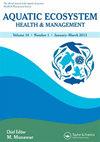前言
IF 0.8
4区 环境科学与生态学
Q4 ENVIRONMENTAL SCIENCES
引用次数: 0
摘要
《水生生态系统健康与管理》杂志的这期特刊是为了表彰一位真正独特的人和杰出的渔业和水生科学家Henry Regier博士。本期特刊中的文章试图强调亨利对我们理解劳伦斯五大湖科学和管理的杰出贡献,以及他对所有有兴趣改善这些湖泊及其渔业的生态健康和状态的人的富有同情心的指导。很少有人能像亨利那样拥有智力和情感能力。他整合和综合来自无数学科的信息的能力,以及他与各行各业的人直接而尊重的互动,使亨利成为我们理解和欣赏五大湖生态结构及其功能的中心节点。他的创新精神在他的遗产中永存,激励和促进了科学家、管理者、决策者、学生和其他人开发新方法,以改善这些湖泊的生态福祉,进而为地方、区域和全球各级的社会带来了众多好处。亨利一直关心做一个以社区为导向的科学家。他认为,关心环境是每个人的责任,更重要的是,关心彼此。这种参与和个人对所有人的承诺的道德价值体系是由他一生的经历塑造的。早年,他在加拿大阿尔伯塔省皮尔斯河谷的一个拓荒者家中度过。13年后,他搬到了安大略湖沿岸。在那里,他观察到了渔业的消亡:无数死去的阿勒维人被冲上岸,被脊髓灰质炎病毒污染的水域(即未经处理的、丢弃的人类排泄物中所含),由于当地工业的污染而经常起火的河流,由于卫生条件差而从湖中飘来的臭味,以及导致富营养化的土地利用做法。由于担心这个美丽的湖泊及其生物群以及此时几乎所有其他水体即将消亡,亨利毕生致力于改善五大湖的健康状况和世界各地的渔业。他这样做主要是为了扭转被掠夺的水道对当地社区的负面影响,这些社区依赖这些资源来获得粮食和经济福利。亨利在专业渔业界享有盛誉,他改变了许多科学家用来批判性地看待和思考渔业资源生态、管理、政策和治理的方法;这种方法是高度综合的、跨学科的,并且在人力和自然资源耦合(CHANS)的背景下使用得最成功!因此,联合国(粮农组织)前内陆渔业资源和水产养殖处处长Robin Welcomme博士这样评价Henry Regier博士:本文章由计算机程序翻译,如有差异,请以英文原文为准。
Preface
This special issue for the Journal, Aquatic Ecosystem Health and Management, is the result of a desire to recognize a truly unique person and distinguished fisheries and aquatic scientist, Dr. Henry Regier. The articles included in this special issue attempt to highlight Henry’s outstanding contributions to our understanding of Laurentian Great Lakes science and management, in addition to his compassionate mentoring to all people with an interest in improving the ecological health and state of these lakes and their fisheries. There are few individuals that have the intellectual and emotional capacity that Henry possesses. His abilities to integrate and synthesize information from a myriad of disciplines and his direct and respectful interactions with people from all walks of life, place Henry as a central node in our understanding of, and appreciation for, how the Great Lakes are ecologically structured and how they function. His innovative spirit lives on in his legacy, inspiring and fostering the development of novel approaches by scientists, managers, policy-makers, students and others to improve the ecological well-being of these lakes that, in turn, have provided a multitude of benefits to society at the local, regional, and global levels. Henry has always cared about being a community-oriented scientist. He believes it is everyone’s responsibility to care for the environment and, more importantly, to care for each other. This moral value system of involvement and personal commitment to all has been shaped by experiences throughout his life. He spent his early years on a pioneer’s homestead in the Pearce River Valley in Alberta, Canada. 13 years later, he moved to the Lake Ontario shoreline. There, he observed the demise of the fisheries: countless dead Alewives washing up on shore, waters that were polluted with the polio virus (i.e. contained in untreated, discarded human waste), rivers that often caught on fire due to pollution from local industries, foul smells wafting from the lake due to poor sanitation, and land use practices leading to eutrophication. Fearing the imminent demise of this magnificent lake and its biota, along with almost all other waterbodies at this time, Henry dedicated his life to improving the health and status of Great Lakes and fisheries throughout the world. He did this, primarily, in order to reverse the negative impacts of despoiled waterways on local communities that depend on these resources for food and economic well-being. Renowned in the professional fisheries community, Henry has transformed the approach many scientists use to view and think critically about fisheries resource ecology, management, policy, and governance; this approach is highly integrative, interdisciplinary, and used most successfully in a coupled human and natural resource (CHANS) context! Thus, Dr. Robin Welcomme, a previous Head of Inland Fisheries Resources and Aquaculture Service of the United Nations (FAO), said this of Dr. Henry Regier:
求助全文
通过发布文献求助,成功后即可免费获取论文全文。
去求助
来源期刊

Aquatic Ecosystem Health & Management
环境科学-海洋与淡水生物学
CiteScore
1.70
自引率
0.00%
发文量
1
审稿时长
18-36 weeks
期刊介绍:
The journal publishes articles on the following themes and topics:
• Original articles focusing on ecosystem-based sciences, ecosystem health and management of marine and aquatic ecosystems
• Reviews, invited perspectives and keynote contributions from conferences
• Special issues on important emerging topics, themes, and ecosystems (climate change, invasive species, HABs, risk assessment, models)
 求助内容:
求助内容: 应助结果提醒方式:
应助结果提醒方式:


